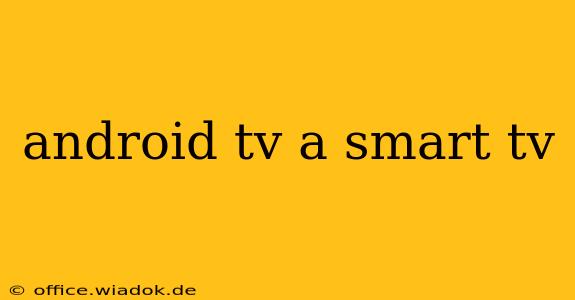The terms "Android TV" and "Smart TV" are often used interchangeably, leading to confusion. While all Android TVs are Smart TVs, not all Smart TVs are Android TVs. This article clarifies the distinction and explores the features and benefits of Android TV.
What is a Smart TV?
A Smart TV is a television set with integrated internet connectivity, allowing access to online streaming services, apps, and other internet-based features. These features go beyond basic television broadcasting, offering a more interactive and personalized viewing experience. Think of it as a regular TV with the added functionality of a computer or tablet, all built into one device. Key features of a Smart TV typically include:
- Streaming Apps: Access to popular streaming platforms like Netflix, Hulu, Disney+, etc.
- Internet Browsing: The ability to browse the internet directly through the TV's interface.
- App Stores: A digital store offering a range of applications to enhance functionality.
- Voice Control: Hands-free operation using voice commands.
What is Android TV?
Android TV is a specific type of Smart TV operating system. Developed by Google, it uses the Android operating system, familiar to many smartphone and tablet users. This means Android TV inherits the strengths of the Android ecosystem: a vast app library, intuitive interface, and seamless integration with other Android devices. Key advantages of Android TV include:
- Extensive App Selection: Access to the Google Play Store, offering thousands of apps and games.
- Google Assistant Integration: Powerful voice control capabilities using Google Assistant.
- Chromecast Built-In: Effortlessly stream content from your Android phone or other Chromecast-compatible devices.
- Easy Navigation: A user-friendly interface makes it simple to find and access your favorite content.
- Cross-Device Compatibility: Seamless integration with other Android devices like smartphones and tablets.
Android TV vs. Other Smart TV Platforms
While Android TV offers a compelling Smart TV experience, it's not the only option. Other operating systems, such as webOS (LG), Tizen (Samsung), and Roku TV, also power Smart TVs, each with its own set of strengths and weaknesses. The best choice depends on individual preferences and needs. Factors to consider include:
- App Ecosystem: The variety and availability of apps.
- User Interface: The ease of use and navigation.
- Integration with Other Devices: Compatibility with existing devices and ecosystems.
- Voice Control Capabilities: The functionality and accuracy of voice control features.
Is Android TV Right for You?
Android TV is a strong contender in the Smart TV market, especially for users already invested in the Google ecosystem. Its vast app selection, seamless Chromecast integration, and intuitive interface make it a user-friendly and feature-rich option. However, consider exploring other Smart TV platforms to find the best fit for your specific needs and preferences.
Conclusion
In short, all Android TVs are Smart TVs, but not all Smart TVs run on Android TV. Android TV offers a robust and user-friendly Smart TV experience, integrating seamlessly with other Android devices and boasting a massive library of apps and games. By understanding the distinctions between these terms, you can make an informed decision when choosing your next television.

